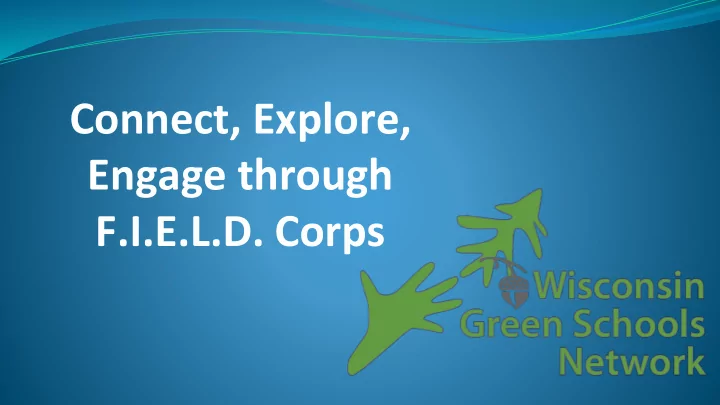

Connect, Explore, Engage through F.I.E.L.D. Corps
Mission & Vision Connect with educators to explore natural and cultural systems and engage learners and leaders for thriving individuals and communities.
Place-Based Education Cultural Systems Natural Systems +
F.I.E.L.D. Corps Program F ostering I nquiry and E ngaging L earners through D iscovery
Hands On, Feet Wet River Crossing Environmental Charter School, Portage, WI
Relevant, Meaningful, Authentic Relevant ● Promote discovery, place-based, service & inquiry- based learning in the students’ own environment Meaningful ● Gives students voice and choice student-directed activities & projects ● Integrates & makes connections to curriculum Authentic ● Real-world problems and solutions
Relevant, Meaningful, and Authentic
Using the community and environment as a context for learning Service- Learning Project- Place-based based Education Learning F.I.E.L.D. Corps
A Three-Strand Approach ➢ CONNECT ➢ EXPLORE ➢ ENGAGE
Community Library Educational Prairie Connect... Building a sense of place
Community Library Educational Prairie Explore... Evaluate, Assess, Examine, Investigate
Community Library Educational Prairie Engage... Analyze Balance, Develop Stewardship
English Math ● Read articles about native prairie ecosystems ● Calculated area of our project ● Researched prairie plants and best practices for ● Calculated amount of seed to order restoration ● Budgeted cost for project ● Wrote grant for ● Created a to scale drawing of site for grant proposal prairie seed and presentation ● Presented to library Field board to get approval for project plans ● Soil samples and testing ● Seed collection ● Seed stratification Social Studies Science ● Prairie design ● Prairie planting ● Explored historic ● Quadrat studies ● Built benches and butterfly houses range and abundance ● Diversity calculations ● Designed ID and informational cards of the prairie ● Plant anatomy ● Plant taxonomy ecosystem ● Plant and animal adaptations for ● Looked at cultural significance survival ● Plant research and selection based on site conditions
F.I.E.L.D. Corps Schools
Place-Based Education ● Interdisciplinary - Not “one more thing” ● Can unify concepts - Integration is critical ● Takes learning into the community - Don’t do it alone! ● Rejuvenating and joyful
Place-Based Science ● Local, relevant phenomena ● Meaningful contexts for students ● Student-centered, culturally responsive
Place-Based Social Studies ● Local culture ● Local economic issues ● Local political contexts ● Local histories
F.I.E.L.D. Coaching Co-planning ● F.I.E.L.D. Coach helps teacher(s) define goals for learning based on standards, and identify current practices, projects, and initiatives to build upon. ● F.I.E.L.D. Coach, teacher, and students (when appropriate) work collaboratively to create learning framework . Co-teaching ● Teacher, students, and community partners implement learning experiences and community projects. F.I.E.L.D. Coach co-teaches with teachers as needed. Co-Reflection ● Teacher, students, community partners, and F.I.E.L.D. Coach evaluate student learning and reflect on experiences and refine frameworks for future learning.
Using ELS to plan and teach content in the community and outdoors
CONNECT ● Students develop and connect with their sense of place and well-being through observation and questioning.
CONNECT B.O.L.D.
CONNECT
EXPLORE ● …evaluate relationships and system structures to demonstrate the interdependence… ● …assess how diversity influences health and resilience… ● …examine the interactions and outcomes of cycles and flows… ● …investigate and analyze how change and adaptation impact…
EXPLORE High Marq, Montello
ENGAGE South Shore Elementary, Port Wing ● …analyze the dynamic balance between natural and cultural systems. ● …engage in experiences to develop stewardship for the sustainability…
ENGAGE
Funding ● Grants ● EPA ● NRF ● Community Foundations ● Private Donations ● School Site Funds
Teacher Testimonial “Now that I have done a project like this once I have a better feel of how I would structure things… to teach them about native Wisconsin plants, plant structures, needs, and how to take care of plants by having them help keep up the space.”
Results The results of an environmental literacy assessment showed a 24% overall increased understanding of knowledge and skills concepts. In addition, students could now show the value of our natural resources and are able to identify and investigate environmental topics.
Results Post assessment data of elementary students indicate that students believe in the importance of water, nature, and community partnerships.
Professional Learning
Professional Learning through Workshops
Youth Summit
Youth Summit
Bring F.I.E.L.D. Corps to Your School
wisconsingreenschoolsnetwork.org
Recommend
More recommend